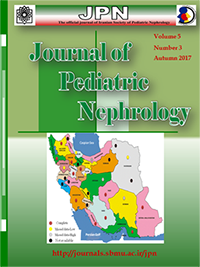Nutrition in Pediatric Nephrotic Syndrome
Journal of Pediatric Nephrology,
Vol. 5 No. 3 (2017),
6 Farvardin 2018
,
Page 1-3
https://doi.org/10.22037/jpn.v5i3.20355
Abstract
Nephrotic Syndrome is a collection of symptoms due to glomerular damage, characterized by proteinuria ≥3.5g/day or a protein-creatinine ratio ≥2. From an etiological point of view, there are three forms of nephrotic syndrome, including congenital, primary, and secondary. The first sign of the disease is periorbital edema, especially in the morning. Diagnostic confirmation is done through evaluation of urine protein, serum electrolytes, BUN, Cr, Albumin, and cholesterol. The main treatment goals of nephrotic syndrome are decreasing proteinuria, preventing complications, and protecting the renal function via appropriate drugs and diet.
The main objective of this study was to review diets required in nephrotic syndrome in children: Protein at a diose of 0.8 mg/kg/day is the most effective diet in nephrotic patients. Low-fat diets (calorie intake <30% and cholesterol ≤200mg/day) can improve hyperlipidemia. Salt and water intake should be restricted in the range of less than 2 gr/day and 1-1.5 liters/day, respectively. Nephrotic syndrome patients have iron, copper, zinc, and calcium deficiency due to increased urine protein excretion or concomitant metabolic disorders.
Keywords: Nephrotic syndrome; Diet; Pediatrics; Nutrition.
- Nephrotic syndrome
- Diet
- Pediatrics
How to Cite
References
Robert M Kliegman; Bonita M D Stanton; Joseph St Geme; Nina F Schor; Nelson Textbook of Pediatrics 20th Ed; 2016 Elsevier.
Avner, E.D, Harmon, W.E, Niaudet, P ,Yoshikawa, N, Emma, F, Goldstein, S.L (Eds.) Pediatric Nephrology 7th Ed; 2016 Springer.
Laura D. Byhan –Gray Jerrilyn D. Burrowes –Glenn M. Chertow. Nutrition in kidney disease. 2nd Ed. 2014 springer.
T. Alp Ikizer, William E Mitch. Handbook of nutrition and the kidney. 7th Ed. 2017 Wolter Kluwer.
Joel D. Kopple, Shaul G Massry, Kamyar Kalantar zadeh. Nutritional management of renal disease. 2013 Elsevier.
Tovar AR, Murguía F, Cruz C, Hernández-Pando R, Aguilar-Salinas CA, Pedraza-Chaverri J, Correa-Rotter R, Torres N. A soy protein diet alters hepatic lipid metabolism gene expression and reduces serum lipids and renal fibrogenic cytokines in rats with chronic nephrotic syndrome. The Journal of nutrition. 2002 Sep 1;132(9):2562-9.
Kaysen G.A. Nutritional Management of Nephrotic Syndrome. Journal of Renal Nutrition 1992; 2(2):50-58.
Karl S. Roth, Barbara H. Amaker, James C M. Chan. Nephrotic Syndrome: Pathogenesis and Management Pediatrics in Review. 2002;23 (7):237-248.
Bak, M., Serdaroglu, E. & Guclu, R. Prophylactic calcium and vitamin D treatments in steroid-treated children with nephrotic syndrome Pediatr Nephrol 2006;2: 350.
Kapur G, Valentini RP, Imam AA, Mattoo TK. Treatment of severe edema in children with nephrotic syndrome with diuretics alone—a prospective study. Clinical Journal of the American Society of Nephrology. 2009 1;4(5):907-13.
Bagga A. Management of steroid sensitive nephrotic syndrome: revised guidelines. Indian pediatrics. 2008;1;45(3).
- Abstract Viewed: 5063 times
- PDF Downloaded: 2868 times

